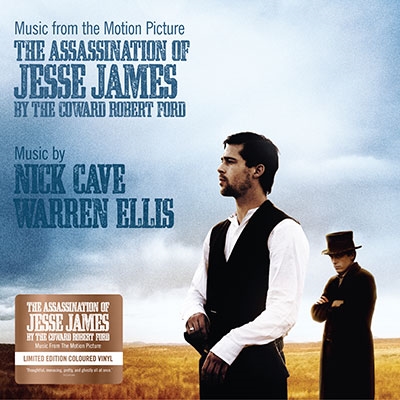|
フォーマット |
LPレコード |
|---|---|
|
構成数 |
1 |
|
国内/輸入 |
輸入 |
|
パッケージ仕様 |
- |
|
発売日 |
2019年04月18日 |
|---|---|
|
規格品番 |
4050538391060 |
|
レーベル |
|
|
SKU |
4050538391060 |
構成数 | 1枚
-
1.[LPレコード]【A面】
-
1.Rather Lovely Thing
-
2.Moving On
-
3.Song for Jesse
-
4.Falling
-
5.Cowgirl
-
6.The Money Train
-
7.What Must Be Done
-
【B面】
-
1.Another Rather Lovely Thing
-
2.Carnival
-
3.Last Ride Back to KC
-
4.What Happens Next
-
5.Destined for Great Things
-
6.Counting the Stars
-
7.Song for Bob
-
-
-
話題のブラピの西部劇、音楽はニック・ケイヴ!! 『ジェシー・ジェームスの暗殺』(2007) サウンドトラック 音楽 ニック・ケイヴ&ウォーレン・エリス 監督 アンドリュー・ドミニク 主演 ブラッド・ピット、ケイシー・アフレック、 サム・シェパード、メアリー・ルイーズ・パーカー 西部開拓史に名を残す無法者/ヒーローといえば 銀行/列車強盗を繰り返したジェシー・ジェームス。 そのジェシー・ジェームスをブラッド・ピットが演じた、 シブめに仕上げた西部劇。監督は、カルト作『チョッパー・ リード』を撮ったオーストラリアの新鋭アンドリュー・ドミニク。 音楽は、オーストラリアのミュージシャンということでか、 なんとニック・ケイヴと彼のバンドのウォーレン・エリスが担当。 ピアノをケイヴ、ヴァイオリンほかをウォーレン・エリスが演奏して の、スロー・フォーク・ポスト・ロック・テイストのインストゥルメンタル。 メロディのうねり具合は、カーター・バーウェルのサウンドの 色気を感じさせる。不安げで甘いテイスト。西部劇といえども 描くのは、ヒーローの心の奥という感じ。美しいです。 (C)馬場敏裕
タワーレコード (2007/11/07)
欲しい物リストに追加

コレクションに追加
サマリー/統計情報
 セブン-イレブン受け取り
セブン-イレブン受け取り
お早めのご注文で発売日前日にお届けいたします
山口県・四国・九州・沖縄県
フラゲ注文受付期間は地域によって異なります。
お住まいの地域をご確認ください。

発売日前日
にお届けします発売日当日
にお届けしますフラゲ注文受付期間は地域によって異なります。
お住まいの地域をご確認ください。



